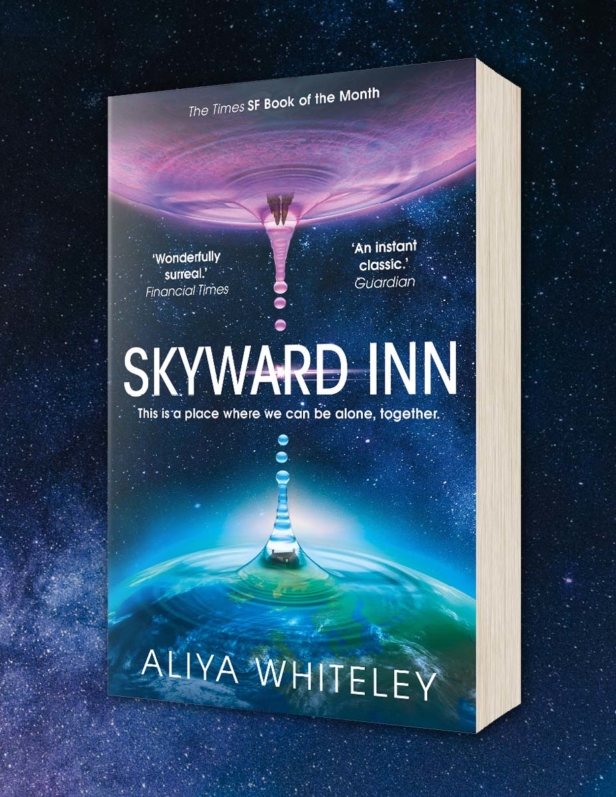Skyward Inn, within the high walls of the Western Protectorate, is a place of safety, where people come together to tell stories of the time before the war with Qita. But safety from what? Qita surrendered without complaint when Earth invaded and innkeepers Jem and Isley, veterans from either side, have regrets but few scars.
However, their peace is disturbed when a visitor known to Isley comes to the inn asking for help, bringing reminders of an unnerving past and triggering an uncertain future. Did humanity really win the war?
An unsettling strange piece of literary fiction, Skyward Inn will lure you in like a warm pub on a winter’s day… only to shock you with immense body horror and surprising twists. We spoke to its author, Aliya Whiteley, about making connections, her love of Devon and being influenced by Daphne du Maurier…
Where and when did you first get the idea for Skyward Inn?
I was in the car, listening to the radio. While randomly flicking through stations I stumbled across a documentary that intrigued me. A man was talking about his love of whisky, and his decision to move from Japan to Scotland to start a pub. He wanted to sell Japanese whisky there, as well as Scotch, and he talked about what it was like to create a place where cultures met and found they had things in common. It was so interesting, so evocative. By the time I arrived home I had most of the idea for the book in my head.
If any, what were your inspirations when writing Skyward Inn?
There are so many inspirations lurking in there, from a whole load of first contact SF stories and films to writers I have long loved and admired, such as Angela Carter and Daphne du Maurier. I tried to use all these influences and bring them together to create something surprising. That approach fitted the theme of the book, I felt.
How did you settle on where to set the story?
When I first came up with the idea I was travelling back from seeing my parents in Devon, and the West Country plays a large role in many of my stories. I was born and raised there, and once I knew Du Maurier was going to be a big influence – it just had an inevitability to it. I love Devon, and I know it well, so I feel comfortable keeping some places and landmarks, and moving other things around or creating in that space.
There are a lot of themes in the book, particularly around loneliness and isolation, why did you choose to focus on these themes?
I worked out pretty early on in the writing process that I wanted to concentrate on the concept of togetherness, and how we think about that. The flipside of that is loneliness, so a lot of the characters start off leading insular lives, trying to make connections, so that the plot revolves around them finding ways to achieve togetherness.
There are also a lot of incredibly complex characters in the book, how did you settle on Jem as your main storyteller?
At first, I tried to write the story from Jem’s brother’s point of view, but I soon found that the heart of the action was the inn itself, and I wanted the reader to be placed directly in that setting, at least for the first two-thirds of the book. From there the book opens up, and other characters take on the story, but Jem was a great beginning – she’s the centre of that early exploration of life in the Protectorate.
The book is divided into five parts rather than chapters, what is the reasoning behind this as a way to divide up the story?
It felt quite natural to me in the writing. I started out writing for the theatre, and things still tend to fall into acts rather than chapters in my head. The five-act structure is very common in plays, and it gave me a strong base to work from. When some elements are very complex in a story, I find it really helps to ground it in setting or structure very strongly. I think that’s what happened with Skyward Inn, for me; it can make these big imaginative leaps because I’m comfortable with the elements around it.
There’s not a huge amount of description of the physical appearance of the characters, both human and alien. How fixed in your mind is the image of the Qita? What do you think they look like?
I like the idea of readers piecing together what they think characters look like from the bits of information they’re given, so I’m reluctant to say! I do have a really strong picture of what the aliens look like, created from the experiences they have undergone in their lives. I’d love to know how readers see them, but I don’t want to give anything away myself…
What are the key themes that you want readers to take away from the book?
Really, for me, it’s all about asking questions, and I’d like readers to ask themselves about how we view togetherness, and loneliness, in all its forms. When are we really alone? What does it mean if we are? In universal terms, and in personal relationships? Would a seamless togetherness solve our problems, or create new ones?
What are you reading right now?
I’m reading a collection of Ursula Le Guin’s novellas called The Found and the Lost. It’s brilliant. I’m a huge fan of hers – she’s another big influence on Skyward Inn. And on all my writing.
Skyward Inn by Aliya Whiteley is available now from Rebellion. Read our review here.
